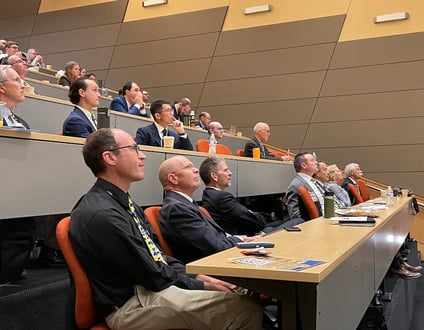From analyzing the effects of social vulnerability and health disparities on postoperative outcomes to mitigating the effects of trauma to evaluating new treatment modalities for pancreatic cancer, the research presented at the annual University of Colorado Department of Surgery Research Symposium on May 22 posed a plethora of new possibilities for patient care.
“The future of surgical research and clinical care is with our trainees,” said Richard Schulick, MD, MBA, chair of the CU Department of Surgery. “I could not be more proud of them and the work they do.”
The annual research symposium highlights research conducted by general surgery residents in basic and translational science and clinical and health science, working with faculty mentors throughout the process. This year’s event featured presentations by 14 different researchers, including research that has been published and presented at other conferences.
“Every year, I’m blown away by the scope and depth of the research being done in our department and across the institution. It’s always really exciting,” said event organizer Robert Meguid, MD, MPH, professor of cardiothoracic surgery. “It shows that as an institution, we're on the cutting edge of producing engaging and impactful research that's guiding patient care and surgical policy.”

Attendees listen to a presenter at the research symposium.
Studying the effects of health disparities
In the area of clinical health science, many of the presentations focused on social determinants of health. Resident Christina Stuart, MD, for example, presented research on the association between social vulnerability and post-operative morbidity after esophagectomy, while Alejandro Suarez-Pierre, MD, spoke about his study on the importance of social vulnerability on long-term outcomes after heart transplantation.
Suarez-Pierre’s study, which looked at adult heart transplant recipients between 2012 and 2021, found that patients who were female, Black or Hispanic, and had diabetes had lower five-year survival rates after surgery and also had higher incidences of hospital readmission and graft rejection.
“This is an opportunity for us to focus on socially vulnerable patients to increase survival,” he said.
Resident Adam Dyas, MD, presented his research on using artificial intelligence to predict postoperative bleeding complications.
“This project is work from a grant that was funded at the beginning of my research time, so it’s nice to watch all the planning and background work culminate in a meaningful study,” Dyas said. “We still have more work to do, but it’s great seeing the early benefits of our work coming to fruition.”
Other clinical research featured at the symposium included:
- Research by Samuel Lai, MD, on how a holistic review process using factors such as volunteerism, research, and leadership eliminates bias and results in more diversity in general surgery residency interview invitations.
- A study by Bailey Lyttle, MD, on the effectiveness of a quality improvement campaign to improve utilization of rapid-sequence MRI, instead of potentially dangerous CT scans, to diagnose appendicitis in children.
- Research by Madeline Thomas, MD, on the growing use of neoadjuvant therapy — including chemotherapy and radiation — prior to surgery in pancreatic cancer.
- A paper by Sudheer Vemuru, MD, exploring disparities in digital literacy among breast cancer patients at Denver Health and showing that those from medically underserved populations were less likely to access their electronic health records.
Beyond the basic
On the basic research side, three of the residents — TJ Schaid, MD, Otto Thielen, MD, and Morgan Hallas, MD — presented their individual research on the effects of trauma on the endothelium, a thin membrane that lines the heart and blood vessels.
Resident Alyssa Vaughn, MD, spoke about her work evaluating a novel therapeutic called CNP-miR146a for the treatment of acute respiratory distress syndrome, noting that the approach has been tested in three different models of lung injury, with promising results.
“It’s always an honor to have the opportunity to present our research work for our own department of surgery,” Vaughn said. “It’s great to attend and participate in our institutional research day to not only share the work I’ve been doing, but also to get a glimpse into the work my co-residents are doing. It’s fascinating how much overlap in concepts there is between research in different subspecialties, and it’s great to think about how to apply some of those concepts to my own work moving forward.”
Also presenting in the basic research section of the symposium was resident Elliott Yee, MD, who highlighted his work targeting the protein CD93 in the treatment of pancreatic cancer.
“I was a bit nervous, given the novelty and early stages of the work we presented, but I was also excited,” Yee said. “Specifically meaningful to me was the collaboration in our lab that laid the foundation for our project and the hard work that has been put into the project to acquire the data we have currently. Targeting the CD93 pathway may be an important part of finding an effective tool to beat pancreatic cancer.”
Other basic science research presented at the symposium included a study by John Iguidbashian, MD, on the best way to preserve donated hearts until they can be transplanted, and research by Bailey Lyttle, MD, evaluating a novel surgical model of pulmonary inflammation in acute kidney injury.
Voice of experience
The day began with a presentation by Frederick Moore, MD, professor emeritus at the University of Florida College of Medicine. Schulick said Moore, who trained at the CU School of Medicine, “gave a terrific talk on the key attributes of being successful in surgical research and provided his career as a great example.”
Meguid echoed Schulick’s praise, voicing appreciation for how Moore shared his journey to leadership in surgery and spoke about how his research ties into the research being conducted by current residents in the CU Department of Surgery.
“It’s clear that our trainees are standing on the shoulders of giants,” Meguid said. “It’s so exciting for me to see their leaps and bounds.”



.png)
